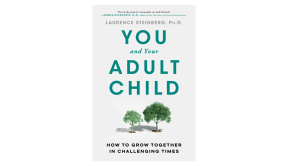
Photo: Danik Prihodko
Generational and cultural changes mean that parenting adult children today is very different to any time before, says psychology professor Lawrence Steinberg.
"It's uncharted territory and filled with a lot of uncertainty. And I think that creates uncomfortable emotions for both the parents and the kids," he tells Jesse Mulligan.

American psychology professor Laurence Steinberg Photo: Supplied
Nowadays, a person's transition to adulthood happens years later than in previous generations, Steinberg says, and adult children are financially dependent on their parents for much longer than either party would wish.
"People are still very perplexed and puzzled by it. And there aren't a lot of rules, really, or guidelines.
"A lot of parents never expected to be providing financial assistance to their kids when their kids were in their 30s … and by the same token, a lot of young people never thought that they would have to come to their parents, hat in hand, when they were in their 30s and ask for help. But that has become the new norm."
A lack of guidance on how to navigate this new norm was the impetus for Steinberg's new book You and Your Adult Child.
He says that when parents think to themselves or say 'Well, when I was your age...", they're really comparing apples and oranges. At the same chronological age, they were probably at least five years further into adult life.
More actively involved in their young adult children's lives than their own parents were, today's parents get to see "close up" the reckless choices and surprisingly bad judgment that can come with a 20-something brain that's still in development, Steinberg says.
Parental expectations for relationship and career milestones can be based on an outdated "timetable".
"If you're looking at your young adult child, and you think 'well, her career seems to be floundering', you have to keep in mind that people's careers take longer to develop and get off the ground by about five years, these days, than they did a generation ago.
"Parents need to know that there's a new timetable out there. In order to figure out whether your child is flourishing or floundering you have to be familiar with what the timetable is these days – not what it was when you were growing up."
When an adult child moves back to the family home after university – for no one knows how long – the most important thing for parents to do is clearly establish the ground rules, Steinberg says.
"You have to have a conversation about things like household chores, expectations for family meals, whether the adult child can come and go, without letting the parents know where they're going ... There are lots of things that have to be sorted out. And the only way to do this is to talk them through."
Issues of autonomy and independence will come to the surface, he says.
"Your adult child needs to demonstrate to themselves and to you that they are capable of being competent adults without your help. And when you're, as a parent, always making suggestions, or being critical or being too involved, you're interfering with that process in a way that can make an adult child angry and can make them perhaps deliberately reject your advice.
"I would be very gentle when making suggestions to an adult child about how to live their life."

'You and Your Adult Child' by Laurence Steinberg, PH.D. Photo: SUPPLIED
It's a bit of a different story if you're subsidising an adult child's living expenses and think they're living a little bit too extravagantly.
If they're "behaving as if they don't really need the money", it's perfectly fine to ask them directly if they really do.
If you become a grandparent, Steinberg recommends people maintain an awareness that the parenting advice of today is very different from 30 years ago.
Grandparents will do well to hesitate before criticising their adult children's ideas and choices about parenting that may be unfamiliar, he says.
"That most likely reflects the fact that they've been given that kind of advice from their paediatrician or they see their friends parenting that way or that's what the parenting gurus write.
"Try to figure out whether their child is only doing what they've been advised by experts to do. That advice might be different than what you got when you were raising them."
Since Steinberg was a young man, he's seen expectations for a parent's emotional availability change immeasurably.
"I was going through a rough patch and I spoke to my dad, with whom I was very close. We were staying up one night having a nightcap after dinner and I said 'Can we talk about our relationship?' And he looked at me like I'd said 'Can we talk about space aliens?' And he said 'Relationship? What relationship? I'm your father.'… I think it's very hard to imagine the parents saying something like that to his kid today."
Above all and always what adult children need their parents to show is support.
"Kids need their parents' love no matter how old they are – support and respect for their need to be and to feel independent."
"There's a lot of tongue-biting that goes on" as the parent of an adult child, Steinberg says, and finding patience with a different rate of development is key.
"So that you can you can watch your child grow through adulthood along the timetable that's established, really, by today's economy and job market, and not overreact when your child doesn't seem to be following the same path that you took when you were a young adult."

